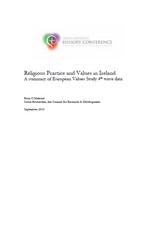A summary of European Values Study 4th wave data
September 2010 | Council for Research & Development
Religious Practice and Values in Ireland |
Introduction
The European Values Study was initiated by the European Value Systems Study Group (EVSSG) in the late 1970s, at that time an informal group of academics. Now, it is carried on in the setting of a foundation, using the (abbreviated) name of the group: European Values Study (EVS).
The original EVSSG researchers aimed at exploring the moral and social values underlying European social and political institutions and governing conduct. At the time of the first survey, the first elections for the European Parliament were approaching, a conference was organized and questions were raised such as:
- Do Europeans share common values?
- Are values changing in Europe and, if so, in what directions?
- Do Christian values continue to permeate European life and culture?
- Is a coherent alternative meaning system replacing that of Christianity?
- What are the implications for European unity?
Previous surveys took place in 1981, 1990 and in 1999/2000. The 4th wave of surveys was conducted in Ireland between July and October of 2008. In Ireland, the National Coordinator is Dr Michael Breen, at the Department of Media and Communication, University of Limerick. The research is funded through universities, research institutes, national science foundations and charitable trusts. The survey organisation in the Republic of Ireland is TNS MRBI, a mainstream Dublin-based commercial survey organisation. Data for Northern Ireland is also collected by TNS MRBI and an analysis is included in this report. The sampled data is analysed separately from the UK population, unlike other large scale datasets. NI data can be aggregated with the data from the Republic and maintain its statistical representativeness. This report compiles data from each jurisdiction separately and jointly for a select number of variables.
What follows is a report on the religiously-specific data from these surveys. It includes the most up to date data for Ireland. A comparative and historical data report will be prepared shortly. The Council for Research & Development of the Irish Episcopal Conference is specifically concerned with longer term trends in Mass attendance, prayer and related social values. The survey contains a vast range of other data, which are not outside the interests of the Council and the Episcopal Conference, but for brevity, it was considered appropriate that a small number of select data were analysed in detail.


